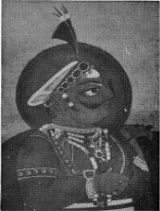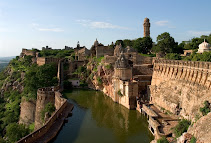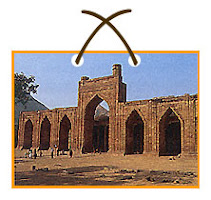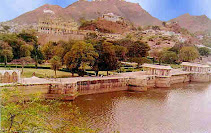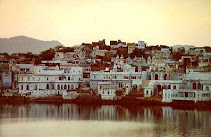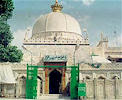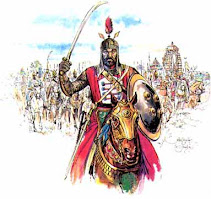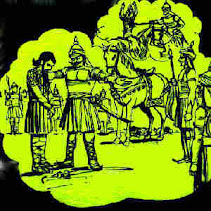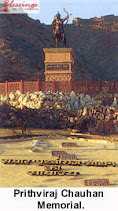The Prince of Ajmer-Prithviraj Chauhan led a very luxurious life in his palace. He never even had a whiff of sorrows and pains but it was during the welfare inspection in his kingdom when he realized that there was a vehement need for greater richness for the happiness of his kingdom. He envisaged having a kingdom with utmost happiness and freeing from pains. This ardent need of the kingdom inspired him to go on a treasure hunt. There was a large chunk of treasure in a place far away but it was very difficult to achieve. Many great warriors and adventurers had been on the treasure hunt, but it was not an easy way, there was lot of trouble and risk involved. Prithvi courageously took it as a challenge. Being a responsible prince, he considered it to be his very duty to serve his kingdom not bothering for any risk even at the expense of his life. Prithvi made up his mind to the expedition of treasure hunt. His strength were his 4 friends-Sanjam, Punder, Arjun and Chand. They joined him with the same enthusiasm and willingness. All of them, together, were like the five fingers of a hand, wherein, even if one of them would be missing, a fist cannot be formed. Their bond was very high and could never be broken, ready to give up life for each other
The rule of the treasure was that it could be acquired by virtue of one’s righteousness. The pre-requisite to win the treasure was to search for four stones-one by one, each stone directing the way to treasure.
They started off with the treasure hunt without retarding any longer. They entered a village .It had been a long journey and not knowing which way to take further they took a halt in that village. That village was under the threat of a dacoit named-Malik. Every citizen of that village was suffering from his atrocities. Prithvi couldn’t withstand this injustice. To him the liberation of the villagers became his first priority .He encouraged every member of the village to shun the injustice. Prithvi with his friends and all the village members fought with the dacoit. It was a fight for the justice and they won it. Seeing his bravery and valour, a village member offered him the first stone which showed a map to the treasure. He had got it from his father who had also made an attempt in seeking the treasure but had failed on half the way. He was successful in achieving the first stone called-‘Paschim ka Pani’. Chand-the friend of Prithvi was a master of many languages. He could read the script on the stone which directed the way to the second stone called-‘Dakshin ki Hawa’ which was their next target.
There were many others too who had made an attempt to reach the treasure and there were yet many others who were making attempts to reach the treasure. One of them was the Prince of Chittor -Samar Singh. He was aware that the first stone (Paschim ka Pani ) was with Prithviraj Chauhan and made up his mind to be at the heels of Prithvi so that he could steal the first stone and cause hurdles on their way. Samar Singh wanted to be the only winner of the treasure. Prithvi and his friends were heading off on the way to the next stage; they stopped on the way and went to take rest in a cave. By an accident the mouth of the cave got closed by a huge rock. All their trials of pushing off the huge rock were unsuccessful. Samar Singh was following them and decided to help them to get the first stone (Paschim ka Pani). He let them out and named himself as Mitwa to conceal his identity. He said that he could show them a short cut route to the nearest village where they all wanted to go. Making a pretext of being their route guide, Mitwa tried stealing the stone (Paschim ka Pani), but Prithvi was clever enough to smell something fishy and catch Samar Singh red handed. Prithvi could guard the stone well without letting it go in wrong hands. However Samar Singh kept vigil on every act of Prithvi and was following him.
Prithvi and his friends reached a village. Inspite of there being a rat-race for the treasure, Prithvi gave the prior importance to humanity. He could not see the injustice which was being faced by the villagers; they sorted all the problems of the village. Impressed with his humanitarian approach an elderly person of the village who knew the location of the second stone (Dakshin ki Hawa) guided Prithvi. To achieve it one had to go in a maze and search for the stone and come out successfully. It was a very difficult process and the one who went in the maze never returned. Prithvi started off, but on the way some dacoits kidnapped Prithvi’s friends. The ransom was to hand over the second stone (Dakshin Ki Hawa) to the dacoits. To Prithvi, there was nothing more important than his friends. He hurried to get the stone. There was also Samar Singh and now they had to compete with each other in winning the stone. At the end the real worthy person-Prithvi won it. He rushed to free his friends. He freed them but by then his friends were brutally tortured by the dacoits. They were the best of friends but now they did not want to participate in the treasure hunt any more. They repelled from their target, left Prithvi all alone and started back for Ajmer. But Prithvi was an iron willed person and no hurdles could ever shake his determination. He proceeded with his mission with the 2 stones- Paschim Ka Pani and Dakshin Ka Hawa. Now that his friends had left him alone, he did not have Chand to read the script on the second stone (Dakshin Ki Hawa). There was a man named- Rounak Singh who had the knowledge of reading that script. Prithvi went in search of Rounak Singh. He met him and after a persuading for long, Rounak Singh helped Prithvi in reading the script. The script revealed that he was yet to search a third stone (Purab Ki Agni) and guided the way to it.
Prithvi learnt that the King of that village was a sadist and had forcibly married Rounak Singh’s daughter and was perpetually torturing her. Prithvi went in a disguise to the palace and freed Rounak Singh’s daughter. This is how; Prithvi took every opportunity to help the mankind which always listed his top priority.
Sanjam, Arjun, Punder and Chand were on their way to Ajmer but could not carry the burden of guilt of leaving Prithvi all alone when he actually needed them. They all made up their mind to go back and assist Prithvi. They went back, confessed and once again got united. Now they started off on their way to the third stone (Purab Ki Agni) with the same vigour.
They come across a lady named Jwala. Jwala had known of the heroic deeds which Prithvi showed in his mission and she considered him a worthy person of the treasure therefore she too joined them. Her only fear was a prediction that one of the treasure searchers would perish and die. She had a soft corner for them and wanted them to gain the treasure and serve their kingdom righteously. They had to pass through a desert where they had to face the dangerous sand storms. They faced it courageously but ran out of food and water. It was the hardest time but their unity gave them the strength. They faced every obstacle on their way and at last reached the third stone (Purab Ki Agni).Here there was an incessant fatal fire. Jwala was afraid that the prediction would come true that one of the treasure searchers would die, she was their well wisher, and therefore to save the others she deliberately put herself in the incessant fire and died. She was mortal but her help to them was immortal. It brought them all to an undying grief, their grief was more than the happiness of achieving the third stone (Purab Ki Agni) they were absolutely deterred and lost their balance, but they didn’t let Jwala’s sacrifice go in a vain, they went further to fulfill their aim which was Jwala’s earnest desire. Days passed by and one day Jwala resonated in Prithvi’s dream asking him for help. She said that her family was in a danger. The dream was very intense and he could not ignore it. He immediately went to her family and found out that Jwala’s sister was carried away by some scamp dacoits. Prithvi traced the dacoits and got Jwala’s sister released. In this way he showed his gratitude to Jwala.
Based on the directions given as per the script, now they were to cross a river. The boat in which they travelled was attacked by Samar Singh and dacoits for the treasure stones but they were defeated. Prithvi also saved the life of the other passengers on board in the boat. The third stone (Purab Ki Agni) conveyed that a girl by the name Mohini from Ongole village would be of a help in tracing the last stone. They searched for Mohini and she led them to the last stage. The last stone was enclosed in an idol and to get it, one had to drop in a river something which was as valuable as the treasure. They were beating their brains to determine what could be equally valuable as the treasure. The four friends thought it to be ‘life’ which is equally valuable to the treasure but Prithvi considered life to be more valuable than the treasure. They thought for long and at last Prithvi concluded that at that moment the three treasure stones-Paschim Ka Pani, Dakshin Ki Hawa and Purab Ki Agni, which he had were as valuable as the treasure. He threw all the three stones in a river. Now he was to break the idol for the fourth stone and thus he gained the fourth stone too. The fourth stone showed the direction of the place which had the huge reserve of treasure they craved for. They reached their destination and now their happiness knew no bounds. Their dream of bringing richness to their kingdom and serving them could be fulfilled. They were thoroughly rejoiced to find the unlimited treasure. But trouble always shadowed them, Samar Singh and the dacoits kept following them and they entered the treasure site. Dacoits didn’t want to share the treasure with Samar Singh and attacked him too. This was the time when Samar Singh realized his mistakes. The dacoits were collecting all the treasure just then the guardians of the treasure entered in and killed all the dacoits. Their duty was to guard the treasure and was to see to it that no wrong person acquired it. They considered Prithvi to be a worthy person and devolved the treasure to him. Samar Singh was guilty of his wrong doings and did not accept the treasure when Prithvi asked him to take half of the treasure.
Now Prithvi was the owner of the treasure. He took it to his kingdom to serve his kinsmen.
Thus the treasure hunt ended making Prithvi victorious.
